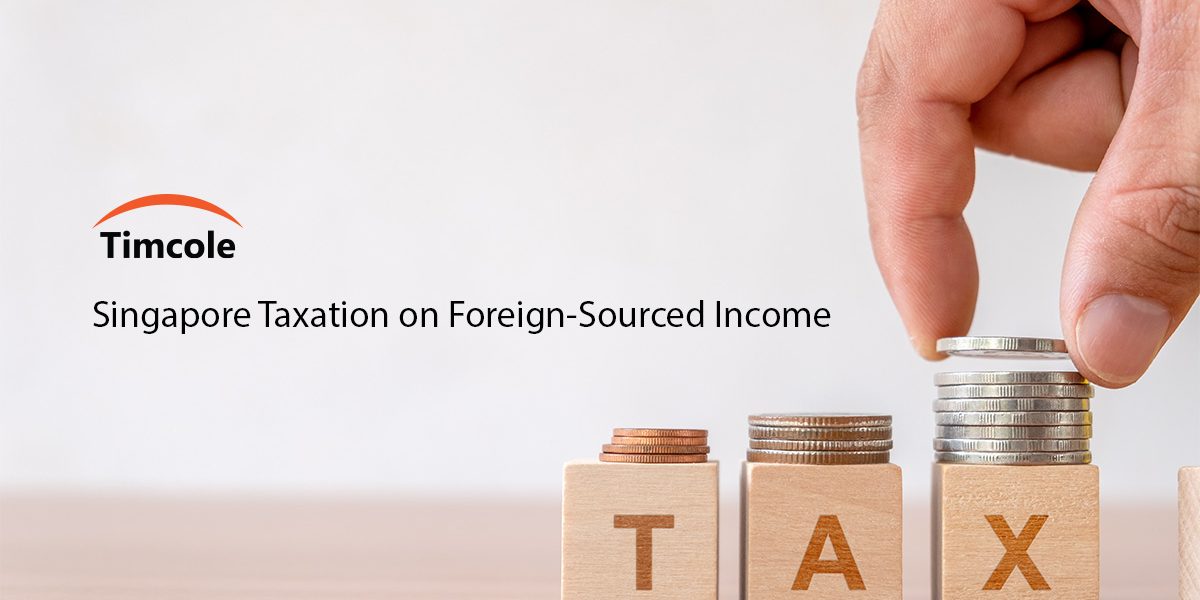Singapore is a bustling business hub in Asia, and for all the right reasons. Thanks to globalization, a significant portion of the country’s income is derived from overseas. Most of this foreign-sourced income, as well as all income earned in Singapore, are subject to corporate tax.
Oftentimes, foreign income will not only be taxable in the foreign country but also when remitted into Singapore – resulting in double taxation. Even though this can be avoided by identifying the locality of the source of income, that is a very controversial and complex process.
How to Differentiate between Foreign-Sourced Income and Singapore-Sourced Income?
So, how can foreign-sourced and Singapore-sourced incomes be differentiated? Well, there are no fixed rules that can be applied to every scenario but taking a close look at the types of transactions and nature of profit may provide some clarity.
The following points can be used as a guide to determine the source of any specific income:
- Recognize the activities that accrued the profits and identify where the activities took place.
- The company’s profits will be deemed as Singapore-sourced if its principal business operations are based in Singapore and have no international business presence.
- For profits acquired from goods and commodities trading, find out where the contracts for sale and purchase are negotiated, completed, and executed.
- For businesses that earn a commission, identify where the commission agent’s activities are performed. The derived income will be treated as Singapore-sourced if the activities are performed within the country.
Furthermore, when an income is classified as foreign-sourced, it is necessary to find out whether or not it is received in Singapore. When an income is earned in an international location, it is assumed to be received in Singapore when it is:
- remitted, transferred or brought into Singapore as dividends, cash, cheque, or via electronic transfer;
- used to settle any corporate debt incurred in Singapore; or
- used to buy any moveable property such as business-related raw materials and equipment that was brought into Singapore.

A Singapore-based company must comply with a list of corporate compliance. To learn more, read:
- ongoing corporate compliance to fulfil
- ACRA corporate compliance to fulfil
- IRAS corporate compliance to fulfil
Foreign-owned businesses are often worried that they may be taxed in Singapore for using local fund management and banking facilities. However, foreign income received in Singapore will only be taxed if it belongs to a Singapore resident or a company located in Singapore. This means non-residents and international businesses that are not headquartered in or operating from Singapore can remit foreign income to Singapore without being subject to taxation. For an overview of Singapore taxation, click here.
As previously mentioned, foreign income may be subject to double taxation – first in the foreign country and another time when it is remitted to Singapore. However, Singapore has introduced various tax benefits to encourage repatriation of foreign-earned incomes. This has boosted the country’s competitiveness and facilitated operations of the fund and wealth management industry.
Under the foreign-sourced income exemption scheme, a tax-resident company in Singapore may get tax exemption on a few categories of remitted foreign income. The categories are:
- Foreign-income as dividend
- Profits from a foreign branch
- Service income earned overseas

A newly start-up company in Singapore can enjoy many tax saving and benefits. Learn more about it here.
How to Receive Exemption from Double Taxation: Qualifying Conditions
All foreign-sourced income that falls in one of the above 3 categories are required to meet the following conditions to qualify for the tax exemption:
- The foreign country from where the income is sent to Singapore must have the highest corporate tax rate of at least 15% when the foreign-sourced income is collected in Singapore;
- Tax against the foreign-sourced income was paid in the overseas jurisdiction where the income was received. The rate at which this income was taxed at may be different from the corporate tax rate; and
- The Comptroller is assured that the tax benefit would prove beneficial to the Singapore tax-resident company.
Once you are certain that the income in consideration is qualified for the tax exemption, you can provide the following information in your Income Tax Return to enjoy the exemption:
- Nature and sum of foreign-income received;
- Details of the jurisdiction from where the foreign-income is received;
- Corporate tax rate of the overseas jurisdiction; and
- Documentation to prove that tax has been settled in the foreign jurisdiction to meet the requirements of the ‘Subject to Tax’ condition.
Concessions Under the ‘Subject to Tax’ Condition
To meet the ‘Subject to Tax’ condition, tax must have been paid in foreign jurisdiction on the overseas income remitted to Singapore. Foreign tax payable on the foreign-earned dividend includes:
- the dividend tax which refers to income tax charged on the dividend by the foreign country; and
- the underlying tax, which refers to income tax payable or paid by the dividend-paying company on the foreign-sourced income from which the dividend was paid.
‘Subject to Tax’ Condition for Companies with Substantive Business Activities in Foreign Country
Additionally, the Comptroller will grant the tax exemption to a company if it can prove that it has received tax concessions in the overseas jurisdiction due to substantive business activities. To prove that your fund meets this requirement to qualify for the tax exemption in Singapore, you must prepare and retain the following documents:
- A declaration that the overseas jurisdiction has offered tax-exemption for the income due to substantive business activities in that jurisdiction; and
- The tax incentive certificate or an approval letter by the foreign jurisdiction. For foreign-sourced dividends, a dividend voucher specifying that the dividend is spared from tax due to tax benefits granted for performing substantive business activities.
In case the foreign-sourced income exemption scheme does not apply, Singapore companies seek relief from double taxation by claiming foreign tax credits against its Singapore tax payable. If you fall into this category, you may claim the following tax credits:
- Double Taxation Relief can be claimed on income received from countries which Singapore has a Double Taxation Agreement (DTA) with; and
- Unilateral Tax Credit can be claimed on income derived from countries with which Singapore does not have a DTA.

Are you a foreign executive working in Singapore?
Th taxation procedure can be different for foreign and international executives. Read our in-depth guide on ‘Taxation of International Executives in Singapore‘.
Singapore’s low-tax regime is what makes the country a perfect choice for international investors. There are many benefits to incorporating a Singapore entity and these tax benefits are one of them. Contact Timcole now if you too want to set up a company in Singapore and receive tax services.








